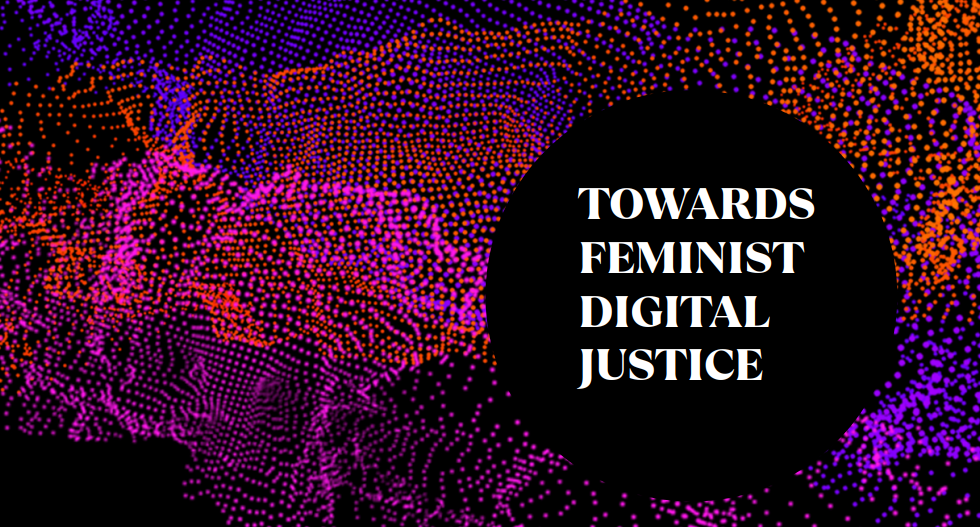SFF’s Program Manager, Agustina Calcagno, writes for Dawn‘s periodical publication ‘Towards Feminist Digital Justice‘. SFF participated in the working group to create ‘The Declaration of Feminist Digital Justice’.
A Little Bit of Context
Since the early 1990s, the Internet, or ‘the information superhighway’, has gradually permeated all our lives’ orders: our homes, jobs, social relations, economy, culture, territories, and everyday practices. The horizontal structure of the World Wide Web inspired a potential of democratisation and emancipation. This new digital public agora had the promise of a space of opportunities for feminist movements, the deconstruction of gender, the reduction of inequalities, and de-hierarchy (Zafra, 2017). From its origins, the digital space has been contested and ever-changing. For feminist collectives, particularly those in the global South, these innovations have provided opportunities to connect, empower, and mobilise.
However, as cyberfeminist, hacktivist, and transfeminist comrades have diagnosed and alerted, the digital space as an extension of the real world also contains gendered power relations, violence, oppression, injustice, and capitalist capture. Today, this digital scenario has become even more alarming; not only the digital space but the entire public sphere is threatened because “the giants of digital capitalism have colonised our bodies and vital worlds” (The Declaration of Feminist Digital Justice, p.1, 2023). It is urgent that our struggles for liberation reclaim the digital realm. This is one of the main messages of the Feminist Digital Justice Declaration (FDJD), which we look at in further depth.
A Powerful Tool for Collectives and Activists in the Global South
“Depending on specific techno-institutional design choices, digital systems can either
reproduce gender exclusion and discrimination or positively transform gender
relations.The norms guiding these choices must, therefore, be grounded in a feminist
vision, enabling the participation of those historically marginalized by patriarchal
systems and institutions.” (FDJD, 2023)
Why is this declaration important to the struggles of feminists in the South? What are its
demands? What can we learn from it?
South Feminist Futures is a transnational association of feminists from the global South committed to building solidarity across borders to shape collective visions for the future, based on our shared history of feminist activism and our determination to sustain and expand the gains of our struggles. We see the Feminist Digital Justice Declaration as a powerful tool of political education that can be used within feminist movements and collectives of the South to take stock of their relationship with technology and ecologies of data production. In that sense, it is important to highlight the declaration’s contributions to identifying the dangers and opportunities of today’s digital political economy from a comprehensive,
intersectional, systemic, and critical point of view. Furthermore, given that the Declaration invites us to think about digital labour, spaces, and territories, what is the relationship between coloniality and technology? How do technology and the digital world intersect with the domestic, private sphere? What protections and safeguards do we need to put in place?
The Declaration is a call to action to critique technological power dynamics across bodies and territories, personal and political, with a view to clawing back power from digital imperialist cisheteropatriarchal capitalism. It presents the digital sphere – a space of struggle – as a central axis of the collective political analyses and strategies of feminist movements. How do we inhabit the digital space and be responsible for its impacts, effects, and consequences? As a framework of values and principles, through its proposals and carefully thought-out themes, the Feminist Digital Justice Declaration proposes a sufficiently broad agenda and frame of reference for the rich diversity of feminist communities across the global South.
Proposals for a Transnational Feminist Articulation
“Aggregate data pools are neither the private fiefdom of collector/aggregator firms norprivate property for individual aggrandizement. As social knowledge that arises from
the collective, Big Data needs to be governed as a commons to ensure equitable benefits
for all” (FDJD, 2023)
How do we build transnational feminist networks with a Southern perspective on
questions of digital justice?
A great first step has been taken: the creation of the Working Group on Feminist Digital Justice and its powerful statement. The next step is to disseminate the declaration to all feminist collectives, set up spaces to debate and deepen the proposals of the manifesto, and design strategies for the global struggle for digital justice. In this sense, it is now up to us to translate the demands of the Declaration into national and regional public policy and laws, share the aspirations of the Declaration with the broader public, and take on the ever more powerful titans of the digital economy.
The ambition of South Feminist Futures is that of a collective South-South feminist collaboration with the aim of envisioning just feminist alternatives. Faced with a complex and threatening scenario of ‘digitality gone wrong’, South Feminist Futures celebrates the existence of the Feminist Digital Justice Declaration as a milestone in the construction of an anti-racist, anti-extractivist, anti-capitalist, anti-colonial, and emancipatory digital future. The struggle continues!
References
Feminist Digital Justice Working Group, Dawn & It for Change. (2023). The Declaration of Feminist Digital Justice. [Online]
Natansonh, G. (2013). Internet in female code. La Crujia. [Online]
Quijano, P. R. (2022). Decolonising and depatriarchalising technologies. [Online]
South Feminist Futures Festival. (2020). Feminisms on the Web. South Feminist Futures [online]
Zafra, R. (2017). Carta Blanca a Remedios Zafra: Arte, redes y (ciber)feminismos. [online]
